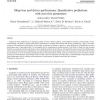Free Online Productivity Tools
i2Speak
i2Symbol
i2OCR
iTex2Img
iWeb2Print
iWeb2Shot
i2Type
iPdf2Split
iPdf2Merge
i2Bopomofo
i2Arabic
i2Style
i2Image
i2PDF
iLatex2Rtf
Sci2ools
COGSR
2011
2011
Sleep loss and driver performance: Quantitative predictions with zero free parameters
Fatigue has been implicated in an alarming number of motor vehicle accidents, costing billions of dollars and thousands of lives. Unfortunately, the ability to predict performance impairments in complex task domains like driving is limited by a gap in our understanding of the explanatory mechanisms. In this paper, we describe an attempt to generate a priori predictions of degradations in driver performance due to sleep deprivation. We accomplish this by integrating an existing account of the effects of sleep loss and circadian rhythms on sustained attention performance with a validated model of driver behavior. The predicted results account for published qualitative trends for driving across multiple days of restricted sleep and total sleep deprivation. The quantitative results show that the model’s performance is worse at baseline and degrades less severely than human driving, and expose some critical areas for future research. Overall, the results illustrate the potential value o...
| Added | 13 May 2011 |
| Updated | 13 May 2011 |
| Type | Journal |
| Year | 2011 |
| Where | COGSR |
| Authors | Glenn Gunzelmann, L. Richard Moore, Dario D. Salvucci, Kevin A. Gluck |
Comments (0)

